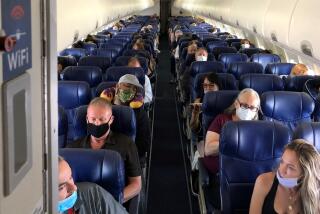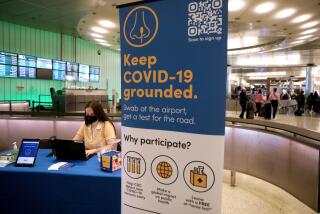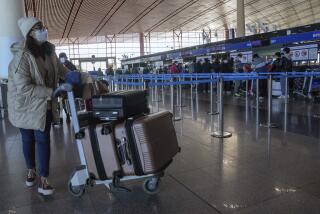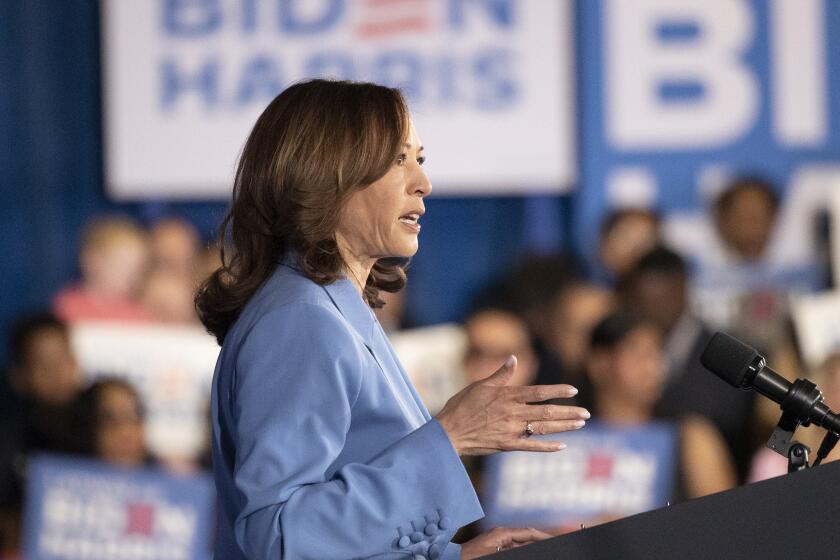Wondering how planes and ships are being disinfected to fight coronavirus? Here’s how
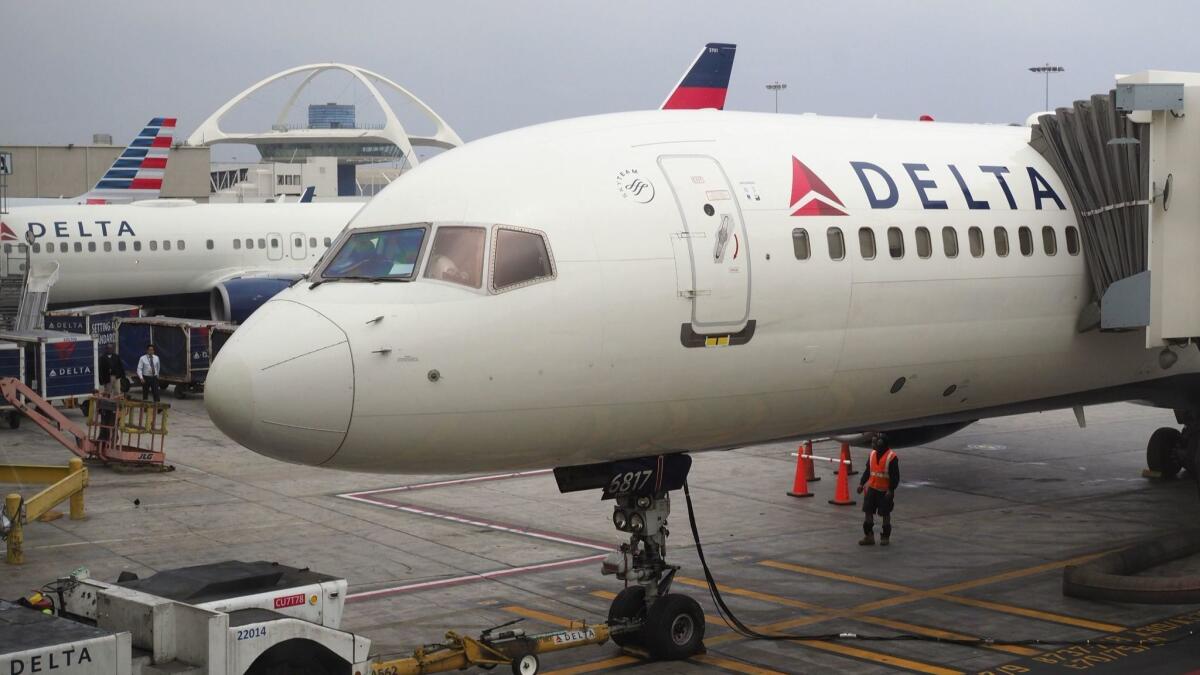
The coronavirus outbreak has spurred Delta Air Lines to new heights of cabin cleaning: spritzing the interior of flights from Asia and Italy with a mist of “a highly effective, EPA-registered disinfectant.”
The Atlanta-based carrier plans to expand the “fogging technique” to all inbound international flights from countries where coronavirus infections have been reported. Linen, dishes, headphones and food carts are also getting an extra round of disinfecting on those planes, the carrier said, adding that the jets’ high-efficiency air filters already are capable of removing coronavirus from cabin air.
Airlines and cruise lines are taking extra steps to protect passengers from COVID-19 — and mitigate the damage that the outbreak could inflict on the world’s $8.8-trillion travel industry.
Planes and ships are being cleaned more frequently and more thoroughly, using chemicals more commonly found in food-processing or healthcare settings, and travel companies are issuing frequent updates on their efforts.
One way to keep passengers from canceling their travel plans is to assure them that their planes and cruise ships are as close to germ-free as possible.
“I think anything the airlines can do to reassure the passengers is worthwhile and could help,” said Madhu Unnikrishnan, editor of the trade publication Airline Weekly. “It can at least give customers who are flying more confidence.”
Despite such efforts, the outbreak that has infected more than 90,000 people and killed about 3,000 others is already expected to inflict a heavy toll on the travel industry.
After a decade of rising travel demand, a trade group for the world’s airlines predicted that the industry this year could suffer its first year of declining demand since the economic meltdown of 2008-09.
The demand for air travel on air carriers in the Asia-Pacific region is expected to drop by at least 13% in 2020, amounting to a loss of $27.8 billion in revenue. The impact to carriers outside of the Asia-Pacific region will be limited to a loss of about $1.5 billion, assuming the drop in demand is restricted primarily to China, according to an analysis by the International Air Transport Assn.
Instead of growing 4.1% in 2020, as previously predicted, the trade group now expects global air travel demand to drop 0.6%.
Many airlines and cruise companies have already temporarily stopped serving mainland China — the hardest-hit region of the globe — and corporate travel managers have canceled hundreds of business trips abroad. That has resulted in a drop of 40.8 million seats available on airlines worldwide in the first four months of 2020 compared with the same period last year, according to OAG, a travel data consultant based in Britain.
U.S. carriers such as Delta, American and United have offered to waive the fees passengers must pay to change their flight reservations not only to China but to South Korea and Italy, where new cases of coronavirus have been reported.
United Airlines confirmed over the weekend that the Chicago-based carrier has postponed the start dates for training of a 23-person class of pilots, amid the flight cancellations and uncertainty over future air travel demand, according to CNBC.
The Cruise Line International Assn. announced that passengers who had visited China, Hong Kong, Macao or South Korea in the 14 days before a cruise departure are prohibited from boarding any of the more than 50 cruise ship brands within its membership. The cruise industry only recently added South Korea to that list as new cases of infections were reported in that country.
To keep that financial hit from growing, airlines and cruise ship operators are emphasizing the extra efforts they have taken to make sure that airline cabins and cruise ship rooms have been scrubbed and disinfected between use.
How long the virus that causes COVID-19 survives on surfaces isn’t known, but studies suggest that it could live for a few hours to several days, according to the World Health Organization, which recommends cleaning surfaces with simple disinfectants to kill the virus.
Singapore Airlines, Korean Air and Qantas Airways helped to evacuate people from the epicenter of the outbreak in the Wuhan region of China. Since then, all three carriers have announced enhanced cleaning procedures.
Korean Air announced last week that the cabins of all flights departing from Incheon Airport to Los Angeles International Airport will be disinfected using “MD-125 chemicals,” a version of a cleaning solution made by New Jersey-based Microgen and used to clean hard surfaces in places as diverse as poultry processors and hospitals.
“MD-125 is a sterilization product approved by the Ministry of Food and Drug Safety as well as the Ministry of Environment,” Korean Air said in a statement. “It is especially known as one of the most effective products to eliminate coronavirus, as the ‘human coronavirus’ is specified on its sterilization list.”
Singapore Airlines is also using the fogging method used by Delta on all planes flying from China.
Under this process, a team of two or three Singapore Airlines staffers fogs the cabins using a chemical called Calla 1452, a disinfectant that has been proven effective against avian flu, the H1N1 virus and severe acute respiratory syndrome (SARS), airline representatives said.
“Common surfaces such as tray tables, handsets, and inflight entertainment screens are cleaned with disinfectant wipes,” the airline said in a message sent to the members of its frequent flier program. “We also remove all headsets, headrest covers, pillow covers, bedsheets, and blankets after every flight sector.”
Qantas Airways posted a message on its website, saying it has adopted “the highest standard in cleaning and disinfecting our cabins, seats, galleys and washrooms. This includes strict disinfection of surfaces and fixtures such as personal television screens, meal tables, baby bassinet tables, and armrests on the aircraft after every flight.”
The Australian-based carrier is relying on Viraclean, a hospital-grade disinfectant, effective against hepatitis B virus, herpes simplex virus and the influenza virus, according to the manufacturer of Viraclean, the Whiteley Corp., which promoted its product on Twitter.
United Airlines is still using an upgraded cleaning process on all international flights that was prompted by the Ebola outbreak of 2014. On all international flights, every hard surface touched by a passenger has been wiped down with a disinfecting solution, the airline said.
In addition, any United flight that has carried a passenger known to have been infected by the novel coronavirus is taken out of service for a complete fumigation and sterilization that includes shampooing the carpeting and wiping down every hard surface with disinfectants, United spokesman Charles Hobart said.
The world’s largest cruise company, Carnival Corp., announced it is more frequently cleaning the staterooms and high-traffic common areas and “that includes the use of Virox that is said to kill coronavirus on surfaces within 30 seconds,” the company said in a statement.
In addition, Carnival Chief Medical Officer Grant Tarling posted a video online over the weekend, explaining the extra procedures that the company has taken to screen out would-be passengers who might be infected and to disinfect the cabins and common areas of the ships to prevent further infections.
“We’ve learned a lot from the world’s top experts and have stepped up our health protocols even more, with the goal of keeping our guests healthy and having a great time on their vacation,” Tarling said.
More to Read
Inside the business of entertainment
The Wide Shot brings you news, analysis and insights on everything from streaming wars to production — and what it all means for the future.
You may occasionally receive promotional content from the Los Angeles Times.
